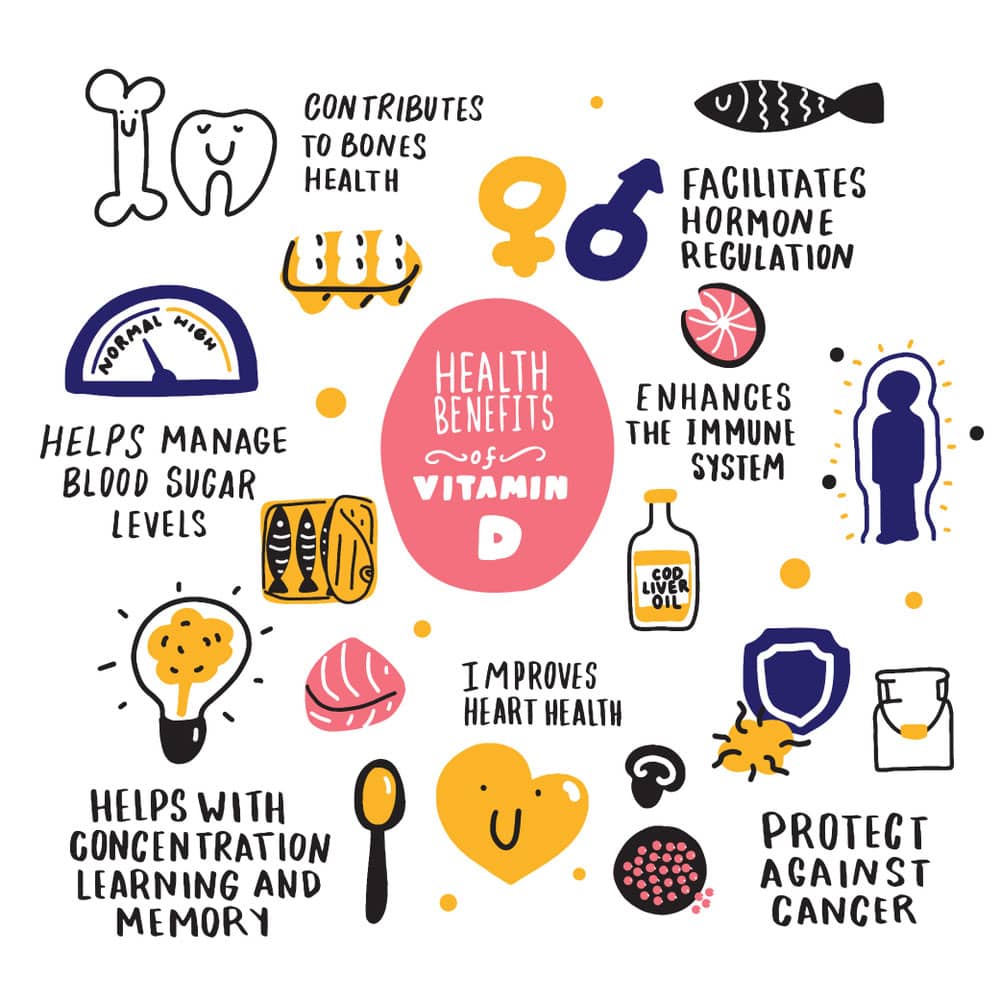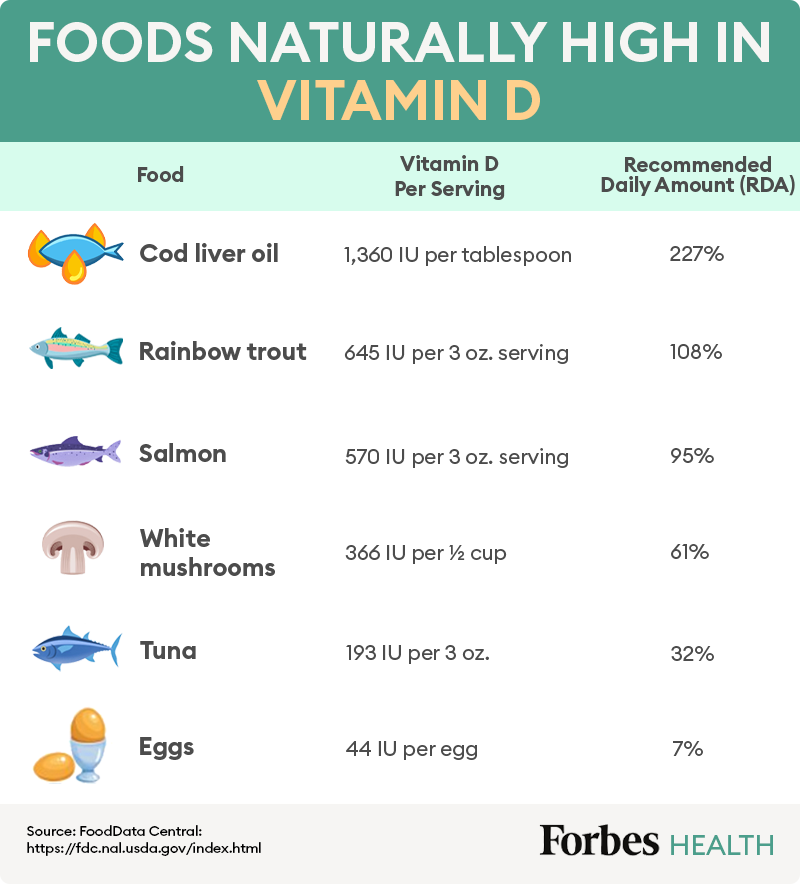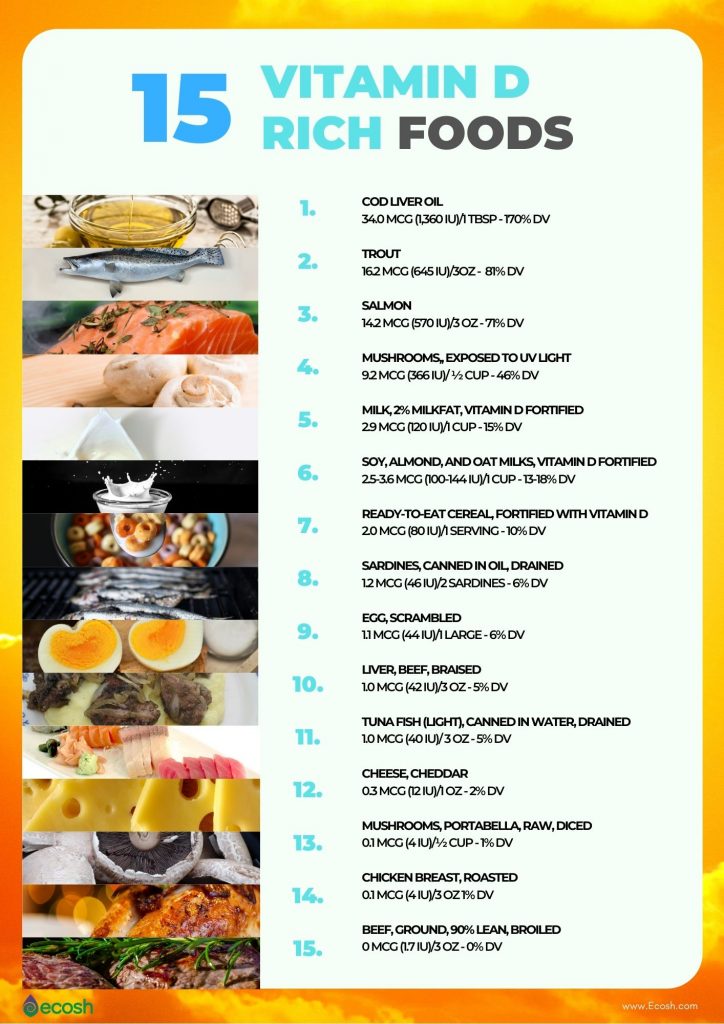
Vitamin D: What is the benefit of Vitamin D?
Vitamin D is both a nutrient we eat and a hormone our bodies make. It is a fat-soluble vitamin that has long been known to help the body absorb and retain calcium and phosphorus; both are critical for building bone. Also, laboratory studies show that vitamin D can reduce cancer cell growth, help control infections and reduce inflammation. Many of the body’s organs and tissues have receptors for vitamin D, which suggest important roles beyond bone health, and scientists are actively investigating other possible functions.
Few foods naturally contain vitamin D, though some foods are fortified with the vitamin. For most people, the best way to get enough vitamin D is taking a supplement because it is hard to eat enough through food. Vitamin D supplements are available in two forms: vitamin D2 (“ergocalciferol” or pre-vitamin D) and vitamin D3 (“cholecalciferol”). Both are also naturally occurring forms that are produced in the presence of the sun’s ultraviolet-B (UVB) rays, hence its nickname, “the sunshine vitamin,” but D2 is produced in plants and fungi and D3 in animals, including humans.
Vitamin D production in the skin is the primary natural source of vitamin D, but many people have insufficient levels because they live in places where sunlight is limited in winter, or because they have limited sun exposure due to being inside much of the time. Also, people with darker skin tend to have lower blood levels of vitamin D because the pigment (melanin) acts like a shade, reducing production of vitamin D (and also reducing damaging effects of sunlight on skin, including skin cancer).
Vitamin D Benefits

It strengthens teeth and bones. Vitamin D3 helps with the regulation and absorption of calcium, and it plays an important role in the health of your teeth and bones
Of all the minerals found in the body, calcium is the most abundant. The majority of this mineral lies in the skeletal bones and the teeth. High levels of calcium in your diet will help to keep your bones and teeth strong. Inadequate calcium in your diet can lead to joint pain with early onset osteoarthritis and early-onset tooth loss.
It strengthens the immune system. One of the most important Vitamin D benefits is its important role in maintaining and strengthening the immune system. It stimulates the production of T-cells and helps to promote a proper response to infectious pathogens, including viruses, bacteria and fungus, that are responsible for various types of illnesses, including the common cold, influenza, and similar community-wide diseases.
It might prevent certain types of cancer. Vitamin D3 can help to prevent the development of certain types of cancer. Epidemiologic research has shown that there is a lower incidence of certain types of cancers for people who live in southern / equatorial locations and have more exposure to the sun.
A number of experiments have indicated that there is a possible connection between Vitamin D and the development of cancer. Vitamin D aids in the repair and regeneration of cells, which could decrease the growth of cancerous tumors, stimulate the death of cells that have been damaged by cancer, and lower the formation of blood vessels in tumors.
It may improve brain function. Scientists have connected Vitamin D with numerous important functions in the body, including how the brain functions. There are Vitamin D receptors located throughout the brain and the spinal cord. Vitamin D benefits you by plays a role in activating and deactivating the synthesis of neurotransmitters, as well as nerve growth and repair.
Additionally, studies on animal subjects have found that Vitamin D helps to protect neurons and can reduce inflammation within the brain. All of these factors likely improves the overall function of the brain, helping to promote alertness and quicker response time. Another study analyzed the effects that Vitamin D levels play on a collection of subjects’ performance on mental exams. This study found that those who had lower levels of Vitamin D performed worse than those who had adequate levels of the vitamin, suggesting it improves mental acuity.
It boosts your mood. Vitamin D benefits your daily mood, especially in the colder, darker months. Several studies have revealed that the symptoms of Seasonal Affective Disorder (SAD) may be linked to low levels of Vitamin D3, associated with the lack of sunlight exposure.
It can aid in weight loss. Did you know this was on of the Vitamin D benefits? If you have been trying to lose weight and haven’t seen the results that you are looking for, you might consider increasing your levels of Vitamin D3 through diet and sunlight exposure. Studies have found that taking a Vitamin D3 supplement, eating more foods that are rich in this vitamin, or simply getting more sun – coupled with eating a well-balanced diet and exercising – can make it easier to lose weight. This is because Vitamin D3 can actually help to keep your levels of body fat down.
Research has revealed that people who are deficient in Vitamin D have a greater risk of becoming obese and developing complications that are related to obesity. Remember though, simply taking a supplement, eating more Vitamin D rich foods, and increasing your sun exposure isn’t enough; you also need to eat a nutritious diet and to get enough exercise.
It can lower the risk of rheumatoid arthritis. Studies have found that people who suffer from rheumatoid arthritis – a chronic inflammatory disease of the joints – often have low levels of Vitamin D. Rheumatoid arthritis is an autoimmune disease. The immune system reacts to the linings of the joints as if these proteins were foreign substances, leading to inflammation in the joints that results in stiffness, pain, and reduced mobility.
Since one of the main Vitamin D benefits is to help maintain the immune system and ensure that it is functioning properly, it makes sense that a deficiency in this vitamin could lead to the development of rheumatoid arthritis. By raising your Vitamin D levels, there is a chance that you could reduce the severity and onset of this disease and other autoimmune diseases.
It lowers the risk of type 2 diabetes. If diabetes runs in your family or you have been diagnosed with hyperglycemia (pre-diabetes), you might want to consider getting more Vitamin D. Recent studies confirm that there is a link between Vitamin D deficiency, the body’s resistance to insulin, and type 2 diabetes. By overcoming insulin resistance, you could potentially prevent the development of type 2 diabetes.
The cells in the pancreas that are responsible for secreting insulin contain alpha-hydroxylase enzyme and VDRs, which both play a role in the body’s tolerance to glucose and resistance to insulin. As a result, not getting enough sunlight can reduce the secretion of insulin from the pancreas, which can create resistance to insulin and affect how the body responds to glucose. Given these findings, it is a good idea to speak to your doctor to find out if getting more Vitamin D benefits for your overall health.
It might reduce the risk of heart disease. An increasing number of studies have indicated that a deficiency in Vitamin D is a risk factor for developing high blood pressure, heart disease, congestive heart failure, peripheral arterial disease, strokes, and heart attack. Improving Vitamin D levels can help to reduce the risk of developing heart disease and the symptoms that are associated with it.
Furthermore, since it may play a role in weight loss and maintaining healthy body weight, this vitamin may also be able to prevent the adverse effects that are associated with obesity and high levels of body fat, including cardiovascular disease. Speak to your doctor to learn more about Vitamin D benefits.
How Much Do You Need?
- Age 1-70: 600 IU
- Age 71 and older: 800 IU
Top 10 most Vitamin D rich foods

- Cod liver oil
- Salmon and mackerel
- Tinned sardines
- Tinned tuna
- Almond milk
- Breakfast cereal
- Eggs
- Shiitake mushrooms
- Caviar
- Margarine

Reference: charmaustin.com, sciencefocus.com

Morning all guys ❣️
☕
Essential vitamin…
Done 😔
💪👍🤜🤛👌👋
မင်မင် ပြောသလိုအောက်ဆုံးထိဆွဲချအမြဲဆွဲချပါတယ်ခင်မျာ
တခပီးတခု ခဏခဏဆွဲချပါတယ်ခင်မျာ
ကုန်တဲ့ထိဆွဲချပါတယ့ခင်မျာ😝😝😁😁
Thanks for sharing
Thanks all
Good night all
🙏🙏🙏
All done
Thanks
Click for my Lovers
ကျေးဇူးပါဗျ။
Thanks for sharing health knowledge..<3
Good evening all guys ❣️
Thanks
Really effective.. Thanks for sharing 🥰❤️
Done
Thanks
I’m so greatful for your article .😍🍀
👍👍👍
Thank you for your help and this post. It’s been great.
Amazing! Vitamin D has numerous benefits of health… thanks lots.
Your articles are extremely helpful to me. Please provide more information!
I’d like to find out more? I’d love to find out more details.
Thank you for writing this article. I appreciate the subject too.
Thanks for sharing health knowledge…
Thanks ❤️
Vitamin D is wonderful!
Thanks for health knowledge!
Thanks 👍
Very efficiently written article. It will be useful to everyone who utilizes it, including myself. Keep doing what you are doing – can’t wait to read more posts.
Yes 🥰
Thanks for sharing knowledge
Vitamin D is amazing
Done
👍👍👍☀️
Vitamins 🍊🥕🍳🍗😍
Thanks for sharing 😘
Done.
🍒💪✊
🍒😊👍
Be AWARE!!
Thank you for sharing your knowledge Aya 🙌
👌👍🍒.
Ads ok👍
Done🍒.
Nice article!! Thanks for your patience.
Thank you for sharing knowledge about vitamin D.
Good Night Our Admins & all clickers. 💤🌃❄️☃️